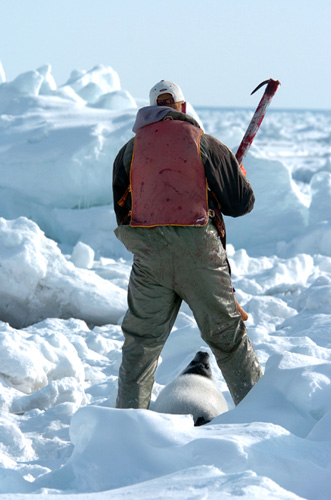
About 300,000 seals are killed annually on the ice covered Atlantic seaboard of Canada. The commercial hunting begins at the end of March every year. The hunt is a centuries old occupation here. The low-income fishing communities here make about a third of their annual earnings from one week of seal hunting in late March.
The federal government says sealing provides a ‘significant’ source of income for thousands of sealers, benefiting them and their families at a time when ‘other fishing options are unavailable in many remote, coastal communities.’
The government argues that the campaign is ecologically sound and economically justified. There will be an over-population of seals, if the hunting is stopped, and the seals will eat away other fish including the commercially valuable cod. The fishing industry will be at a loss.
The seal’s skin is sold for good prices, while its meat is a delicacy for those who eat it. Seal oil is rich in proteins and is sold in capsules as a nutrition supplement. It is also believed to cure heart deseases.
Seal hunting has been facing severe opposition in the past about three decades from animal rights activists who say it is inhuman and cruel to kill hundreds of thousands of seals every year.
The manner in which they are killed has also invited a lot of criticism. Hunters usually club the animals to death. Very few people use guns. Clubbing is cruel as the animal is repeatedly beaten with heavy clubs. There are also charges of ‘fleecing alive‘ the young ones, though the hunters deny it.
The activists have always projected the killing of young harp seals, called ‘whitecoats’ after their white fur, as a serious crime.
While the commercial hunters deny killing whitecoats, which was banned by federal law in 1987, they accuse the rights activists of interfering in their normal livelihood. Seal hunting is a business closely monitored by government.
Mark Small, a veteran seal hunter in Newfoundland, is annoyed by the charges of cruelty and retorts ‘It gives you a terrible feeling as a human being. We’re not a cruel, savage race that came out of the forest somewhere.’
The hunters say ‘it is hypocritical for the animal rights activists to take issue with a well-managed and sustainable seal harvest in Canada.’
Tom Rideout, Newfoundland’s fisheries minister, said ‘our province takes no issue with the fact that the Germans hunt 1.2 million deer and over 500,000 wild boars a year.’
Groups of activists have been compelling governments to ban sale of seal products, saying it is the only effective way to discourage seal hunting. The European Parliament moved closer to banning seal products in january this year.

